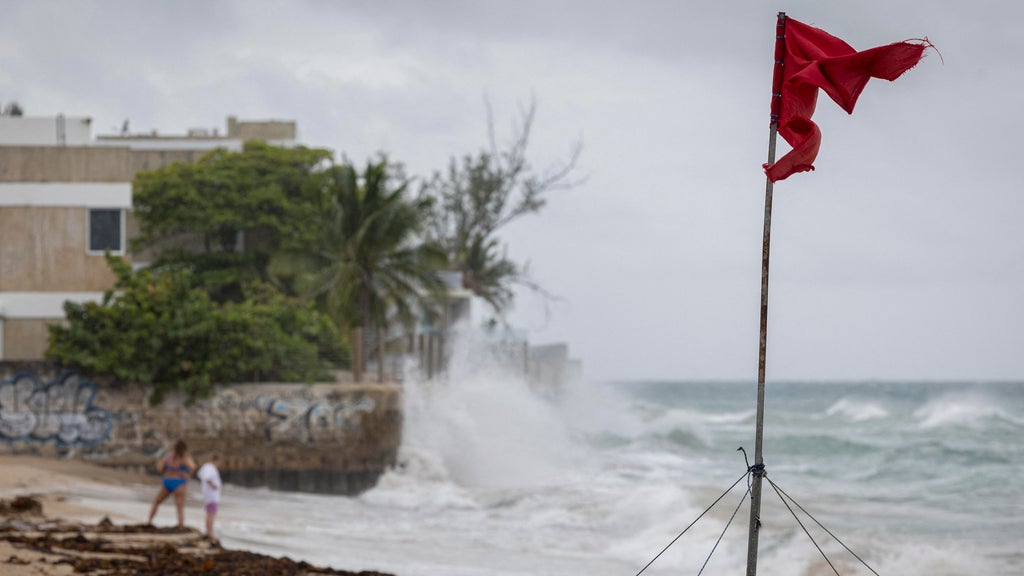Top Stories
Hurricane Erin Set to Impact Massachusetts Beaches with Dangerous Conditions

Hurricane Erin is intensifying in the Atlantic Ocean, posing a significant risk to the beaches of Massachusetts despite being hundreds of miles away from the coast. As the storm progresses, the effects will be felt along the East Coast, with dangerous rip currents, elevated waves, and potential beach erosion expected throughout the week.
Life-Threatening Rip Currents Ahead
Forecasters warn of life-threatening rip currents stretching from the Carolinas to Massachusetts. The risk is set to escalate through the end of the week, creating hazardous swimming conditions. Rip currents are rapid channels of water that can swiftly pull even seasoned swimmers away from shore. Beachgoers are strongly advised to only swim in designated areas monitored by lifeguards and to observe any red flag warnings that may be issued.
Powerful Waves and Erosion Risks
In addition to rip currents, Hurricane Erin is generating large swells that will impact coastal waters. Boaters and surfers should prepare for rough seas, as waves are anticipated to be several feet higher than usual. These conditions pose risks not only for recreational activities but also for potential rescue operations, complicating efforts to assist individuals in distress.
The threat of beach erosion is another concern associated with Hurricane Erin. Strong waves can erode sand, damage protective dunes, and diminish natural barriers that safeguard inland areas from future storms. South-facing beaches along Cape Cod, Nantucket, and Martha’s Vineyard are particularly vulnerable to erosion over the coming days.
Wind gusts are also expected to increase in Massachusetts, reaching speeds of over 40 mph in some areas, especially along the Cape and Islands. While these winds are not anticipated to cause extensive damage like a direct landfall, they may result in choppy waters and rough ferry rides, affecting maritime travel.
Historical Context of Hurricanes in Massachusetts
Although hurricanes are infrequent in Massachusetts, the state has experienced severe tropical storms in its history. Notable hurricanes include the devastating storm of 1938, Category 3 storms Carol and Edna in 1954, and Hurricane Bob, which struck southeastern Massachusetts in 1991 and left hundreds of thousands without power and caused significant coastal damage.
Even hurricanes that remain offshore, such as Hurricane Edouard in 1996, have demonstrated that large storms can still create dangerous surf conditions and beach erosion. Hurricane Erin is expected to follow a similar pattern, impacting the coast with powerful winds and waves without making landfall.
As the peak of hurricane season approaches, meteorologists urge residents to remain vigilant and prepared for potential storms. Jacob Wycoff, a meteorologist with WBZ-TV, emphasizes the importance of staying informed about weather developments. Wycoff is a member of the National Weather Association and the American Meteorological Society, lending credibility to his warnings and forecasts.
In summary, while Hurricane Erin is not projected to make landfall in Massachusetts, its effects will be felt far and wide. Residents and beachgoers should exercise caution and remain aware of changing conditions as the storm approaches.
-

 Lifestyle3 months ago
Lifestyle3 months agoLibraries Challenge Rising E-Book Costs Amid Growing Demand
-

 Sports3 months ago
Sports3 months agoTyreek Hill Responds to Tua Tagovailoa’s Comments on Team Dynamics
-

 Sports3 months ago
Sports3 months agoLiverpool Secures Agreement to Sign Young Striker Will Wright
-

 Lifestyle3 months ago
Lifestyle3 months agoSave Your Split Tomatoes: Expert Tips for Gardeners
-

 Lifestyle3 months ago
Lifestyle3 months agoPrincess Beatrice’s Daughter Athena Joins Siblings at London Parade
-

 World3 months ago
World3 months agoWinter Storms Lash New South Wales with Snow, Flood Risks
-

 Science3 months ago
Science3 months agoTrump Administration Moves to Repeal Key Climate Regulation
-

 Science2 months ago
Science2 months agoSan Francisco Hosts Unique Contest to Identify “Performative Males”
-

 Business3 months ago
Business3 months agoSoFi Technologies Shares Slip 2% Following Insider Stock Sale
-

 Science3 months ago
Science3 months agoNew Tool Reveals Link Between Horse Coat Condition and Parasites
-

 Sports3 months ago
Sports3 months agoElon Musk Sculpture Travels From Utah to Yosemite National Park
-

 Science3 months ago
Science3 months agoNew Study Confirms Humans Transported Stonehenge Bluestones









